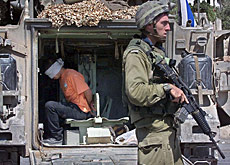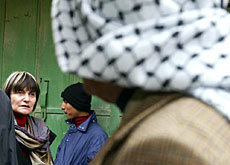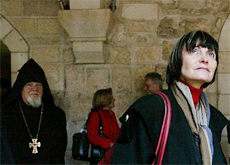Palestinian prisoners get a new start in life

The impending release of hundreds of Palestinian prisoners has cast a spotlight on a Swiss-funded project in the West Bank city of Ramallah.
The Abu Djihad training centre, which was visited last week by the Swiss foreign minister, helps to integrate former inmates back into civilian life.
On Thursday the Israeli cabinet agreed to release around 900 prisoners as a gesture of goodwill ahead of Tuesday’s Middle East peace summit in Egypt.
The announcement coincided with the arrival in the region of Swiss Foreign Minister Micheline Calmy-Rey, who has been holding talks with senior officials in both the occupied territories and Israel.
The Swiss foreign minister toured a number of Swiss-funded projects, including Abu Djihad, during her time in the West Bank.
Built in Ramallah in 1998, it is the nerve centre of a programme conceived ten years ago to rehabilitate prisoners.
Swiss-funded project
Co-financed by Switzerland to the tune of SFr1.5 million ($1.23 million) a year, the college has helped around 6,000 people since its inception.
It offers training in a number of areas, including electronics, car mechanics and computer graphic design.
“By visiting our Palestinian partners, whether in Ramallah, Bethlehem or Gaza, the Swiss foreign minister – who is also in charge of development aid – has sent a signal of hope and solidarity,” said Mario Carera, head of the Swiss Agency for Development and Cooperation’s (SDC) bureau for the West Bank and Gaza Strip.
Much of the credit for the Abu Djihad project goes to Annick Tonti, who arrived in Jerusalem in 1994 as the head of the SDC’s bureau and the Swiss government’s representative to the newly elected Palestinian Authority.
Rehabilitating prisoners
Tonti had begun addressing the issue of rehabilitating prisoners the previous year, having been engaged by the Palestinian Liberation Organisation (PLO) to look at the problem.
“As a result of the Oslo peace process we already knew that prisoners would be freed. The PLO asked us to work with them on this programme,” recalled Tonti, who is now head of the SDC’s operations in the Middle East and North Africa.
Tonti says the PLO turned to Switzerland for two reasons.
Firstly, the country was closely identified with the Geneva-based International Committee of the Red Cross, which is the sole organisation to have access to Palestinian prisoners held in Israeli jails.
Secondly, the Palestinians knew that the Swiss had experience in the area of rehabilitating prisoners.
“Switzerland had already set up a similar scheme in Mozambique, integrating guerrillas and government troops back into civilian life,” said Tonti.
Hope for thousands
Around 2,000 former prisoners now use the Abu Djihad centre, according to Mario Carera.
But jobs remain hard to come by, with unemployment running at around 50 per cent in the Gaza Strip and 30 per cent in the West Bank.
For Annick Tonti, though, the project is not just about giving participants the tools to make a living.
She says it also provides an environment for young people to give their emotions a free rein and speak about their lives. She says most of them need some kind of psychological support.
According to the SDC, the rehabilitation programme also has a clear political goal: to offer young Palestinians an alternative path, away from radicalism.
swissinfo, Jugurtha Aït-Ahmed in Ramallah
Switzerland’s annual aid budget for the occupied territories is SFr25 million.
SFr15 million of this sum goes to ICRC-run projects, the World Food Programme and the UN refugee agency.
SFr10 million funds programmes run by Palestinian non-governmental organisations.
Switzerland agreed in the wake of the Oslo peace process to help the reconstruction of the occupied territories.
The Swiss government launched an aid programme in June 1994.
The SDC’s coordination office in East Jerusalem employs eight people, including five Palestinians.

In compliance with the JTI standards
More: SWI swissinfo.ch certified by the Journalism Trust Initiative


You can find an overview of ongoing debates with our journalists here . Please join us!
If you want to start a conversation about a topic raised in this article or want to report factual errors, email us at english@swissinfo.ch.